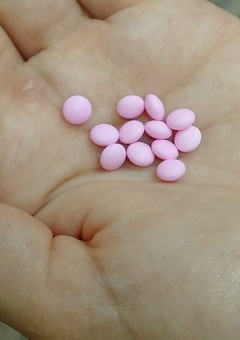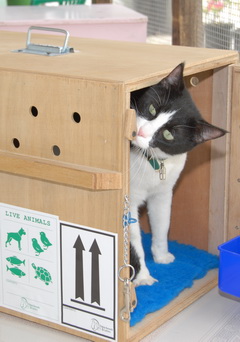transit care & airport oversight
Transit Care is the care of your pets and other animals which are passing through an airport as they travel from somewhere to somewhere, but stopping at some mid-point airport for a period of time in transit as they wait for their connecting, onward flight.
Every transiting animal wants transit care.
DKC is the Animal Handler for Emirates SkyCargo and dnata, providing animal care management on behalf of these two organisations for the countless animals booked as manifest cargo which transit through Dubai International Airport (DXB) and Dubai World Central (DWC) each year... for your pets of all kinds and an endless variety of small and large exotics.
We also have a long-standing, very cooperative working relationship with the UAE Ministry Veterinarians who are directly involved in all animal import, export and transit processes.
Our work includes providing the basic care we all expect animals to get, as well as the overall management of health, travel box repair/maintenance/replacement, and general wellbeing. We ensure that their transit stops and any waiting periods they experience for import clearance or departing flights in Dubai are comfortable and safe. This said, be aware that our work applies only to animals traveling as manifest cargo, not accompanied baggage (which are handled by a separate team of Emirates staff on the passenger side of their business).
how it all works
Shortly following the arrival of any flight carrying animals booked as manifest cargo (it is global standard practice that all animals are loaded last onto departing flights and unloaded first upon arrival), they are transferred from the aircraft in climate-controlled vehicles to the AVI facilities in the cargo area at Dubai International Airport (DXB) and Dubai World Central (DWC). ("AVI" stands for the French "Animaux Vivant" - meaning "Live Animals" - and is the industry-standard term for all animals travelling by air.) These facilities are not fancy but are quiet and have enclosures for pets, as well as appropriate spaces for other types of animal. As with the vehicles, it is a fully climate-controlled place, of course.
Pets travelling on Emirates are taken out of their travel boxes and put into the enclosures, and are given plenty of water and fed. And throughout the transit care period, aside from being given water and food, all animals are checked and rechecked for anything they might need, and dogs are also walked and regularly exercised. We also make sure that any pets which have done a bit of toileting (or anything else) during their travels are bathed and that their travel box is cleaned too. All animals are checked carefully for general health, including any physical or other issues that might need to be attended to, urgent or otherwise. Our on-site handlers are not veterinarians but they are all exhaustively trained, including having successfully completed IATA's Live Animal Regulations (LAR) examination, and, when necessary, will call in our vet when they see a potential issue with any pet or something which clearly needs veterinary attention. At Dubai International Airport (DXB), our handlers are permanently based (24/7) in the AVI facility in order to care for and oversee transiting animals.
We also pay close attention to the travel boxes, making repairs if needed and even replacing them entirely if called for, either because they are too damaged, not well-enough built or indeed not the correct size. Damaged or missing water bowls are replaced, too. And of course any bedding that has travelled with pets will be washed if soiled, time permitting; if there is not enough time before the onward flight, the bedding will be replaced with shredded newspaper or pee-pads so that your pet commences the next leg of his or her journey in a clean, comfortable and safe travel box.
Since animals really should not be over-eating when travelling, if the transit period and/or total travel time is relatively short, only a small amount of food is given. Naturally, for exotic animals, the process is rather different and entirely depends on the species involved. Importantly, access to the AVI facility is strictly secure, limited to specific airline ground crew and to DKC; however, it is only DKC who physically handle and care for all these animals while they are in the AVI facility (pets and exotics alike) ~ DKC are not involved in the movement of animals to/from the AVI facility and aircraft because airlines have their own staff to handle this specialised work, but once receiving animals in the AVI facility, until we hand them over to airline staff for their onward flights, we provide all the care and oversight they need.
Feeding:
As we've said, our handlers will feed your pet (and other animals) during the transit period. For dogs and cats we rely on Royal Canin, but if your pet has need of something else or has any kind of special diet or, indeed, if you simply are concerned about him or her getting an upset stomach from a change of diet (however short-lived that might be), we recommend that a small bag of your chosen food is attached securely to the top of the travel box (not inside!), marked "Dinner for transit time!" or something else similarly clear, so that this is used instead of our standard fare.
Special Care / Handling:
Should any kind of special care or handling for your pet be required during their transit period (besides the special handling all animals get of course!), please just let your airline know in advance and they, in turn, will let us know and we, in turn, will let you know through them, or even directly, whether or not we can accommodate. Usually we can, so don't worry.
Medication:
If your pet or other animal requires medication during transit in Dubai, our handlers are fully trained to administer most types, including insulin for diabetics, and/or we can ensure that our vet is present to handle this if required. Do please ensure that all details about the medication and the administration of it are provided to your airline at the time you book the flight and that a letter from your veterinarian is provided which clearly states the following:
- The medical condition for which medication is required.
- The medication prescribed ~ name(s) and format (e.g. tablet, drops, cream, injection... etc.)
- Instructions for administering during normal circumstances: e.g. 1 tablet with food every morning
- AND instructions for administering during the transit period.
A copy of the instructions must be taped to the travel box and the original veterinary letter must travel with the original travel documents.
airport oversight
DKC not only provides animal care and welfare oversight for animals transiting through Dubai on Emirates, but also, in conjunction with our constant 24/7 presence at the Emirates transit facility at DXB (in addition to the daily management of the relocations of our own customers' pets, of course!), we also provide the oversight needed for the welfare of animals being relocated by other pet relocations agents in the UAE which are using DXB for their shipments. This includes imports and exports travelling on Emirates, as well as pet relocations and airlines based at the other DXB terminal, when those animals and DKC are in that AVI area.
We visually check the animals inside of their travel boxes to ensure that they are well, keep water bowls topped up, and generally inspect the quality of travel crates and water bowls. If DKC see any issues relating to a pet's behaviour, well-being or their travel box and water bowl, we report these concerns to the airline for them to take action on, if required.









